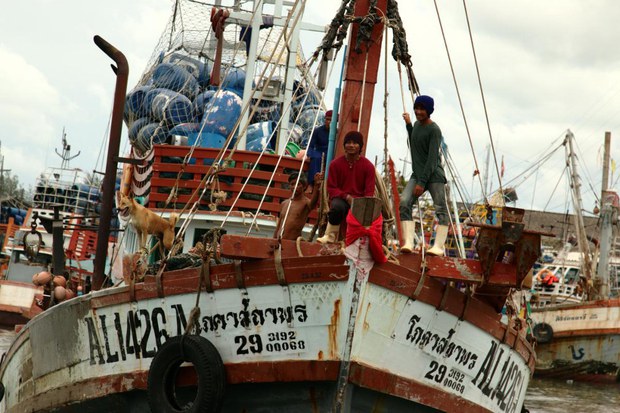Deplorable Conditions Persist in Thai Fishing Industry: Human Rights Watch
2018.01.23
Washington
 A Thai fishing trawler arrives in port in Ratsada, Phuket, May 22, 2016.
A Thai fishing trawler arrives in port in Ratsada, Phuket, May 22, 2016.
Forced labor and other reprehensible conditions persist in Thailand’s fishing industry despite governmental promises of reforms, Human Rights Watch (HRW) said Tuesday in a new report.
HRW presented its 134-page report, based on interviews with more than 200 migrant workers, boat owners and activists, to members of the European Parliament in Brussels.
The report spells out how migrants – many of them from Myanmar and Cambodia – can be victims of human trafficking who are forced to work on fishing boats, prevented from changing employers, have their pay held or not be paid the minimum wage.
“It was torture. One time I was so tired I fell off the boat, but they pulled me back on board,” a trafficking survivor from Myanmar, identified as Zin Min Thet, told HRW interviewers in Thailand’s Ranong province in March 2016.
HRW pointed out that Thailand had received a “yellow card” warning in 2015, a year after media reports exposed human trafficking and brutalization in the fishing industry – meaning it could face a ban on exporting seafood to the European Union (EU) because of its unregulated practices. In addition, the United States placed Thailand on Tier 2 of its Watch List in its annual Trafficking in Persons (TIP) report.
Despite those admonitions, HRW found “shortcomings in the implementation of new government regulations and resistance in the fishing industry to reforms.”
“No one should be fooled by regulations that look good on paper but are not properly enforced,” HRW Asia Director Brad Adams said in a news release issued with the report.
“The E.U. and U.S. urgently need to increase pressure on Thailand to protect the rights, health and safety of fishers.”
A Thai official questioned the validity of the report, titled “Hidden Chains: Forced Labor and Rights Abuses in Thailand’s Fishing Industry.”
“What HRW showed was based on one-sided information that was compiled. This is somewhat obsolete,” Vice Adm. Wanaphol Klomkaew, with the Command Center for Combating Illegal Fishing, told BenarNews. “We understand (HRW) wants to discredit us.”
For the report, HRW interviewed 248 current and former workers in the Thai fishing industry, between 2015 and 2017. A total of 174 Burmese, 70 Cambodian, and four Thai nationals, participated in 58 focus-group and individual interviews.
Of those interviewed, HRW declared that 95 men had been designated as victims of trafficking who had either escaped or were rescued between May 2014 and July 2016. Most of the remaining 153 men were working in the fishing industry when they were interviewed.
Pink cards
Among the reforms instituted by the Thai government is a registration system where migrant workers are issued and must carry “pink cards” to reduce the number of undocumented workers. The cards tie the migrants to a specific location and, in some cases, require an employer’s permission to change jobs.
“You can’t leave because if you leave you won’t get paid, and if you want to leave at the end, it’s only if they let you. Unless you leave without your money and your [pink] card, you have to obtain their permission,” Cambodian Bien Vorn told HRW interviewers in Rayong Province in November 2016.
HRW, however, did credit the Thai government for establishing a Port-in, Port-out (PIPO) system in all major ports. It requires boats to report for inspections, including of crew lists, as they depart and return to port, and creating procedures to inspect boats at sea.
The crew lists helped “end some of the worst abuses, such as captains killing crew members” before they returned to port and would need to be paid, HRW said.
Yet the rights watchdog also challenged the government’s efforts.
“The labor inspection regime is largely a theatrical exercise for international consumption,” HRW said. “For example, under the PIPO system, HRW found officials speak to ship captains and boat owners and check documents but rarely conduct interviews with migrant fishers.”
Wanaphol, the official at the center for combating illegal fishing, defended the government’s actions.
“PIPO outlets could not check all fishing boats,” he said. “There are some independent fishing boats who might hire illegal workers.
“However, we have patrol boats from many government agencies – the navy, fisheries department, the marine department, marine police, and the Department of Marine and Coastal – to help detect them at sea.”
In addition, the government conducts random checks.
“We have a way to assess the risk of certain groups of fishing boats – Common Risk Based Analysis – to determine who may have illegal laborers,” Wanaphol said.
“We prioritize the groups that are at risk of breaking the laws, fishing rules or labor rules and we do check on them on both outbound and inbound legs. We randomly check otherwise non-risk boats.”
Wanaphol said there had been no reports of illegal fishing boats in the last six months. “Except for some laborers who may have been smuggled into the country and did not register properly. If they haven’t registered, the PIPO could not fully control them.”
Recommendations
HRW recommended that the Thai government adopt legislation against forced labor that ensures appropriate criminal and civil penalties and protection for victims.
The advocacy group called for the government to end restrictions on migrant workers’ freedom of movement, including eliminating the requirement that those with pink cards must seek prior permission to travel.
It also called on the prime minister’s office to increase investigations and prosecutions of human trafficking and forced labor in the fishing industry.
The office should establish an independent commission to recommend changes in laws, regulations and policies adversely affecting migrant workers’ rights, HRW said among its recommendations, adding that the employment department should revise regulations to permit migrant fishermen to change jobs at any time and without restriction.
Wilawan Watcharasakvet in Bangkok contributed to this report.







